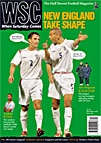 Julius Bergmann looks at the alarming recent rise in racism at German matches
Julius Bergmann looks at the alarming recent rise in racism at German matches
Long before Anton Ferdinand and Micah Richards made allegations of verbal abuse from opponents during England Under-21s’ recent win in Leverkusen, German football had been shaken by a series of racially motivated incidents. Werder Bremen striker Patrick Owomoyela was branded as “non-German” by an extreme right party when he was being considered for the 2006 World Cup and Schalke’s Gerald Asamoah, another Germany player, was subject to abuse during a cup tie in Rostock. In Aachen a referee threatened to abandon a Bundesliga match unless offensive chanting stopped. For many, the real low point came when Germany fans sang discriminatory songs during the Euro 2008 qualifier in Bratislava in October.
“Discrimination is not a problem that has just happened, it’s been going on all the time,” says Stuart Dykes from the organisation Dem Ball is’ egal wer ihn tritt (The ball doesn’t care who kicks it). “A lot of people, however, have just been playing it down.” As a first step to ameliorating the situation, the German FA (DFB) recently redrafted their anti-discrimination regulations. The new wording specifically names discrimination as “unsporting conduct” and allows for much harsher penalties.
Since the new regulations came into force, Hallescher FC and Hansa Rostock amateurs have been forced to play a match behind closed doors following racist chanting by fans, while Alemannia Aachen were fined €50,000 after fans chanted “Asylanten!” (asylum seekers). Aachen supporters claimed visiting Mönchengladbach fans were the target, but most observers said Kahe, Gladbach’s Brazilian forward, was the focus.
Problems persist, though. “A regulation on its own isn’t enough,” says Matthias Gärtner from fans’ organisation BAFF. “People must be trained to understand and follow it.” In the lower leagues, a lot of catching-up is needed. Bundesliga match officials are effectively full-time professionals and well trained, but their lower-league colleagues are amateur and all too often have neither the experience nor knowledge to recognise problems correctly and report them. In September the players from TuS Makkabi Berlin II, a Jewish community club, walked off the pitch complaining of persistent anti-Semitic abuse from spectators and opponents. The referee maintained he had heard nothing. A disciplinary hearing upheld the claims and members of the opposing club were ordered to visit an anti-racist seminar. The referee was effectively sacked.
At a match in Leipzig, Nigeria-born sweeper Ade Ogungbure complained to the referee of racial abuse from the crowd. Despite this there was no mention of the abuse in either the referee’s report or that of the fourth official. An investigation by the local association was only started following intervention from the new DFB president Theo Zwanziger and using footage from the local TV company. Again the allegations were upheld.
Among the next steps is a conference in January for fan groups from across Germany. Organised by the DFB, it will discuss issues around racism and discrimination in addition to violence and hooliganism. “The DFB must stop seeing all fans as possible perpetrators and rather use us as partners in the battle against discrimination,” says Dagmar Starke from Supporters Club Düsseldorf. And there is more than enough evidence that fans and the association are on the same wave length. In a recent interview Zwanziger stated that, in terms of anti-discrimination work, “shaping of opinions is the key” and found an unlikely ally. A Bayern ultras group, Schickeria München, marked the recent DFB “Show racism the red card” action day with a banner reading: “A red card doesn’t solve the problem, something needs to change in society.”
If the public disquiet over the allegations from Leverkusen and the singing in Slovakia help reshape opinions in German society, it is to be hoped that the effects will soon be seen in football arenas.
From WSC 238 December 2006. What was happening this month